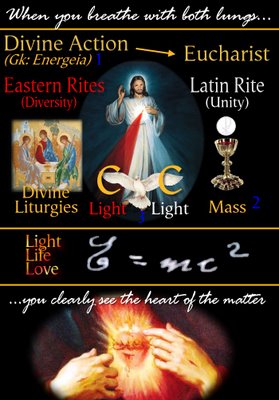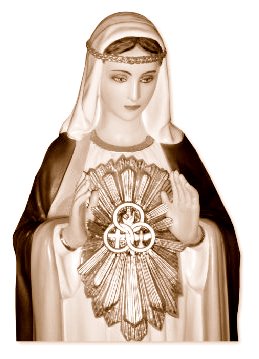An Afternoon with Einstein (Revisited)

Copyright 2002
by Richard. L. Byrnes
A tribute to humble and saintly priest Fr. Charles McTague whom I had the great pleasure of conversing with for the better part of an hour in 2006, only a few months before he was to be called to his eternal rest.
In 1939, while studying at Darlington Seminary, Father Charlie read in Scribners magazine about Einstein and his search for a universal meaning of life. According to that article, Einstein became an atheist and later an agnostic who believed there is a wisdom in the Universe, a plan, an order. This magazine article sparked in Father Charlie a lifelong interest in Einstein and he became intrigued by mankind's greatest mind struggling with the concept of the Divine. Father promised himself that one day he would meet with Einstein.
Eventually Father Charlie was ordained and his duties as a priest engulfed his life, leaving him with little thought of Einstein. In 1952, while visiting his mother, he found himself with some unexpected time to himself. Not wanting to waste a moment, Father Charlie impulsively called Einstein's home in Princeton. Einstein's secretary answered and Father asked if Dr. Einstein was in. She responded that he was but why did he want to know.
"I'm a Catholic priest and I wondered if Dr. Einstein would have the time to meet with me today?"
The secretary excused herself and when she returned to the phone, Father Charlie was flabbergasted when she said, "Dr. Einstein says that he would be delighted to meet with you some time this afternoon."
The secretary and Father Charlie set up a time for the meeting and he rushed to the train station and bought a ticket to Princeton. When he arrived in Princeton Father Charlie hailed a cab and asked the cabdriver to drive around Princeton; he had gotten "cold feet." He didn't have the nerve to cavalierly order the taxicab driver to take him to the famous Einstein's home.
Finally, the driver grew impatient with the driving and the young priest sitting inert in the back seat and demanded that the priest tell him where he wanted to be taken.
Father meekly replied, "Do you know where Albert Einstein lives?" He hoped that the driver would not ask him why he thought he could meet with the great Einstein.
"Of course I do!" the driver responded. "Everyone in Princeton knows Albert Einstein. He lives at 118 Mercer Street." Then he asked, "Is that where you want to go?"
Father Charlie nodded and the driver drove to Einstein's home. Sensing that Father was either shy or intimidated about visiting with the renowned physicist, the driver parked in front of Einstein's home, and casually walked up to Einstein's front door and rang the bell. From the back seat of the cab Father Charlie watched, unnerved by the possibility that Albert Einstein would open the door and send the driver away in disgust.
Instead a woman came to the door and Father Charlie heard her exclaim, "Of course, we are expecting him."
The secretary took Father Charlie upstairs to the study and asked him to wait while she looked for the renowned physicist. Father Charlie walked over to an open window and looked out onto a backyard where Einstein, dressed in a sweatshirt and white pants, no socks and sneakers, sat under a tree under a huge tree reading a book. He came when the secretary called and a few minutes later Father Charlie was sitting and talking with the esteemed Einstein.
Father Charlie had come to talk about Christ in light of Einstein's theories and Einstein obliged and directed the discussion towards the Mass. "What is it? What happens?" Einstein asked his guest. Father Charlie explained that during Mass heaven and earth are joined by the infinite living body of Christ when the whole substance of bread and wine becomes the true body and blood of Christ, only the appearances of the bread and wine remaining. Einstein became extremely interested in the concept of transubstantiation, the changing of one substance into another. He asked Father Charlie to explain the conversion in the Eucharist, by the priest at Mass. Father Charlie eagerly explained transubstantiation to his host as analogous to Einstein's famous formula E=MC2: Just as matter can be broken into energy—God becomes present on earth in the Mass.
While Einstein listened attentively, Father Charlie said, "During the Last Supper Christ said to his disciples, 'This is my body, this is my blood, that is being shed for you.' This means that what looks like bread and wine by God's power have become the body and blood of Christ."
"Then this means," Einstein said, "that Christ is infinite and timeless."
"Exactly," Father Charlie replied.
"Transubstantiation troubled him," Father Charlie recalled.
"The idea that Christ actually becomes present in the Blessed Sacrament seemed difficult for him to accept as he showed no feeling about it."
Father Charlie, when asked to elaborate on that moment and tell how he explained to one of the great empirical minds of history how a priest at Mass can change bread and wine into the body and blood of Christ, answered, "I wanted to give an example that would relate to Einstein's life as a scientist. I asked him to look at a wire from a lamp I had unplugged from the wall and placed across my lap. He saw a wire stretched out before me, lifeless and still. I then took the same wire and plugged it back into the wall and switched on the light. The wire had pulsated with enough power to light up a room." Father Charlie paused after relating that little anecdote and said, "I think he understood and was pleased with my example."
Imagine this unorthodox Catholic priest sitting in the study of the world's greatest mind explaining with great clarity, using a simple physical analogy, the mystery of transubstantiation. The imagined was almost unimaginable. But Father Charlie, whether talking to a homeless man, addicted and filled with despair, or to Albert Einstein about transubstantiation, is able to transcend barriers, relate faith to experience and compel people to respond to him.
For thirty minutes Father Charlie and Einstein sat and talked while they both sipped tea. Father Charlie couldn't remember an instance when Einstein argued a point about religion. "But he did ask me a lot of questions," Father Charlie recalled: What is the Mass? What happens at the consecration of the Mass? What is transubstantiation?
Before their tete-a-tete ended Einstein asked Father Charlie to send him all the books he could find about the Mass written in German. When he returned home Father Charlie visited the Cooper Union Book Shop in New York City and sent Einstein the books Mysteries of Christianity, by Maurice delaTaille; Misterium Fidei, by Della Tai; and Christ Our Brother, by Carl Adam.
Three years later Albert Einstein died and a week after his death Father Charlie visited Einstein's home in Princeton and asked the secretary if Einstein had left any notes related to the books that he had sent. She told Father Charlie that she remembered the books and would check for notes. She went upstairs and found the books packed in Einstein's library but she found no notes. The books would be sent to Israel, she said.
When he tells the Einstein story Father Charlie looks at you with his familiar impish grin and says, "Wouldn't it have been something to have the notes of the world's greatest mind grappling to understand the Catholic mystery of transubstantiation?"
Others have expressed their concerns about the Eucharist to Father Charlie and their trouble with believing in transubstantiation. His response usually begins with a quote from scripture, John 6:51-56, where Jesus is speaking to his disciples, explaining to them that they must "Eat His flesh and drink His blood." Many disciples left Christ that day, Father Charlie tells the doubters, because they too had trouble understanding and embracing, what He said. "If it's good enough for the 12 who remained," Father Charlie tells them, "it's good enough for me."
An afternoon spent with Einstein is not about Father Charlie, the saintly priest and benefactor working in other people's lives to bring them closer to their God. It is rather a story about a simple priest, but a complicated man, taking a risk and following an impulse to squeeze the most out of life for himself and another, as he did during the Newark race rebellion in 1967.
Mike Rizzio
Imitate Mary
Become like Jesus
Live for the Triune God
Seek the Light of Our Lord Jesus Christ
See you on the High Ground!
+++
* - J.M.J. + O.B.T. + M.G.R. stands for: Jesus, Mary and Joseph;
O Beata Trinitas; St. Michael, St. Gabriel and St. Raphael































No comments:
Post a Comment